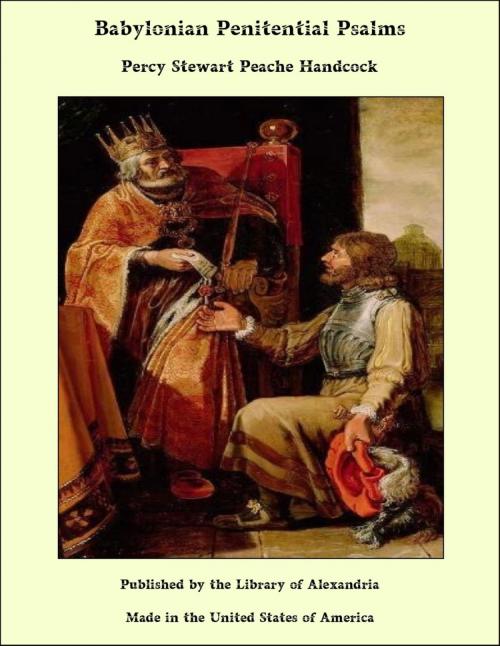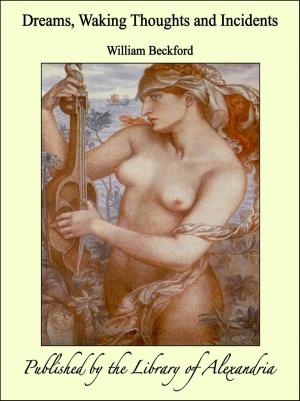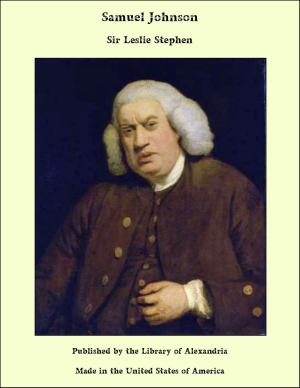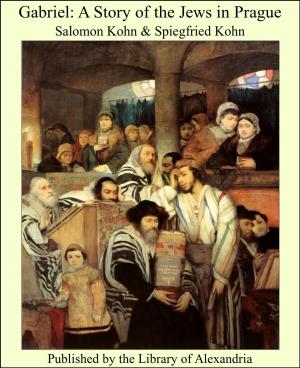Babylonian Penitential Psalms
Nonfiction, Religion & Spirituality, New Age, History, Fiction & Literature| Author: | Percy Stewart Peache Handcock | ISBN: | 9781465615336 |
| Publisher: | Library of Alexandria | Publication: | March 8, 2015 |
| Imprint: | Language: | English |
| Author: | Percy Stewart Peache Handcock |
| ISBN: | 9781465615336 |
| Publisher: | Library of Alexandria |
| Publication: | March 8, 2015 |
| Imprint: | |
| Language: | English |
In the penitential psalms the religious beliefs of the Babylonians and Assyrians attain their ethical zenith. The term "penitential psalms" is, of course, purely general; but in view of the striking similarity which some of these compositions bear to certain Biblical psalms, both in tone and sometimes even in phraseology, the term on the whole constitutes a fairly apt designation of those Assyrian and Babylonian religious texts in which the keynote is a consciousness of sin and shortcoming on the part of the suppliant coupled with an appeal to a deity or deities for absolution. We are chiefly indebted to Ashurbanipal's library at Nineveh for the preservation of this branch of literature. This library had existed in a humble form from the days of Sargon, King of Assyria from 722 to 705 b.c., but in the reign of Ashurbanipal (668 to 626 b.c.) it was greatly extended and enlarged. This king dispatched scribes to other cities in Babylonia and Assyria where libraries existed, and procured copies for his own library at Nineveh. Thus it is that a very large proportion of the cuneiform inscriptions recovered from Ashurbanipal's library are copies of earlier documents. Professor Jastrow is of opinion that penitential psalms formed part of the religious literature of the Babylonians as early as 2,000 b.c., but that it is very doubtful if any of those preserved go back to that date. The pervading characteristic of these texts is the anxiety of the suppliant to assuage the anger of the deity. Whether such anger was well merited or not was irrelevant. The hard fact that some misfortune had befallen the suppliant irresistibly argued the anger of the deity as the cause thereof; hence the necessity of appeasing that anger in order to avert further disaster. To accomplish this end the mediation of the priest is required to support and reinforce the petitioner's appeal. Thus we find that, as in the incantation texts it was the duty and privilege of the priest to instruct the layman as to the appropriate formula to be used, the recitation of which was accompanied with an appeal of the priest, so in the psalms the priest instructs the penitent what to say, and himself supplements the confession with an assurance of his client's sincerity, and an earnest request that the prayer for forgiveness be granted. So pronounced, indeed, was this idea in regard to the necessity of a mediator among the Babylonians and Assyrians that sometimes the son or servant of the god himself played that essential part in the drama. In the penitential psalms the suppliant, in many cases, was probably the king, as the disasters and misfortunes to which reference is made are of a national rather than personal character, and thus incidentally these texts form an exception to the otherwise more or less true generalisation that the Babylonian and Assyrian kings of those days, according to their own annals, never sustained a check or suffered a defeat.
In the penitential psalms the religious beliefs of the Babylonians and Assyrians attain their ethical zenith. The term "penitential psalms" is, of course, purely general; but in view of the striking similarity which some of these compositions bear to certain Biblical psalms, both in tone and sometimes even in phraseology, the term on the whole constitutes a fairly apt designation of those Assyrian and Babylonian religious texts in which the keynote is a consciousness of sin and shortcoming on the part of the suppliant coupled with an appeal to a deity or deities for absolution. We are chiefly indebted to Ashurbanipal's library at Nineveh for the preservation of this branch of literature. This library had existed in a humble form from the days of Sargon, King of Assyria from 722 to 705 b.c., but in the reign of Ashurbanipal (668 to 626 b.c.) it was greatly extended and enlarged. This king dispatched scribes to other cities in Babylonia and Assyria where libraries existed, and procured copies for his own library at Nineveh. Thus it is that a very large proportion of the cuneiform inscriptions recovered from Ashurbanipal's library are copies of earlier documents. Professor Jastrow is of opinion that penitential psalms formed part of the religious literature of the Babylonians as early as 2,000 b.c., but that it is very doubtful if any of those preserved go back to that date. The pervading characteristic of these texts is the anxiety of the suppliant to assuage the anger of the deity. Whether such anger was well merited or not was irrelevant. The hard fact that some misfortune had befallen the suppliant irresistibly argued the anger of the deity as the cause thereof; hence the necessity of appeasing that anger in order to avert further disaster. To accomplish this end the mediation of the priest is required to support and reinforce the petitioner's appeal. Thus we find that, as in the incantation texts it was the duty and privilege of the priest to instruct the layman as to the appropriate formula to be used, the recitation of which was accompanied with an appeal of the priest, so in the psalms the priest instructs the penitent what to say, and himself supplements the confession with an assurance of his client's sincerity, and an earnest request that the prayer for forgiveness be granted. So pronounced, indeed, was this idea in regard to the necessity of a mediator among the Babylonians and Assyrians that sometimes the son or servant of the god himself played that essential part in the drama. In the penitential psalms the suppliant, in many cases, was probably the king, as the disasters and misfortunes to which reference is made are of a national rather than personal character, and thus incidentally these texts form an exception to the otherwise more or less true generalisation that the Babylonian and Assyrian kings of those days, according to their own annals, never sustained a check or suffered a defeat.















